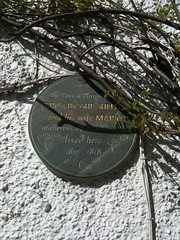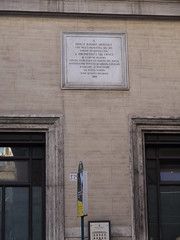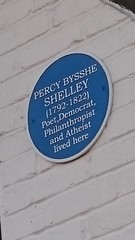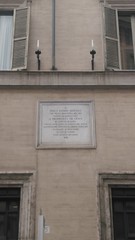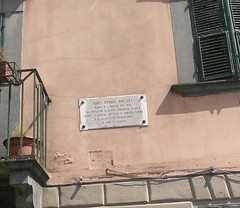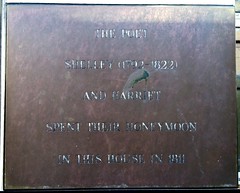Percy Bysshe Shelley


Percy Bysshe Shelley
(1792-1822)
poet, radical thinker, democrat, philanthropist, and atheist
Family tree
friend of Edward John Trelawney
Commemorated on 14 plaques
Percy Bysshe Shelley 1792-1822 poet lived here in 1811
15 Poland Street, W1, London, United Kingdom where they lived
Poet and radical thinker Percy Bysshe Shelley 1792 - 1822 Two of his earliest works were printed here.
Warwick Street, Worthing, United Kingdom where they printed two of his earliest works
Percy Bysshe Shelley 1792-1822 poet & radical thinker & Mary Shelley 1797-1851 author of Frankenstein lived in a house on this site 1815-16
87 Marchmont Street, London, United Kingdom where they lived
In this churchyard lie the mortal remains of Mary Shelley author of "Frankenstein" her father William author of "Political Justice" her mother Mary author of "The Rights of Women" her son Percy, Jane his wife and the heart of Percy Bysshe her husband the poet
St Peter's, Bournemouth, United Kingdom where they lies
The poet & playwright Percy Bysshe Shelley and his wife Mary authoress of Frankenstein lived here 1817-1818
Shelley House, West Street, Marlow, United Kingdom where they lived (1816-1817)
Percy Bysshe Shelley lived at No. 26 Nelson Square which formerly stood on a site north of this building
Applegarth House, Nelson Square, SE1, London, United Kingdom where they lived near
A Percy Bysshe Shelley che nella primavera del 1819 scrisse in questa casa il Prometeo e lia cenci il comune di Roma cento anni dopo la nascita del poeta sostenitore invitto di liberta popolari avversate ai suoi tempi da tutta Europa pose questo ricordo 1892
English translation:
Via del Corso 375, Rome, Italy where they was
Tra il 1819 e il 1820 in questi luoghi gia di via Valfonda Percy Bysshe Shelley lavoro al 'Prometeo Liberato' compose l'Ode al Vento occidentale
Via Valfonda, 50123, Florence, Italy where they wrote (1818-1819)
Percy Bysshe Shelley 1792-1822 regarded as one of the finest poets in the English language was born in Warnham near Horsham.
West Street, Horsham, United Kingdom where they was born near (1792)
Percy Bysshe Shelley (1792-1822) Poet, Democrat, Philanthropist and Atheist lived here
Reeds Hill, Easthampstead, Bracknell, United Kingdom where they lived
Percy Bysshe Shelley durante l'estate del 1818 nel fervore di nuove creazioni d'arte cerco la quiete ospitale di questa terra e si allieto di ascenderne le fiorite pendici
English translation: Percy Bysshe Shelley during the summer of 1818 in the fervor of new art creations, looked to the hospitable quiet of this land and gladly ascended the flowery slopes
Casa Bertini, Bagni di Lucca, Italy where they stayed (1818)
Percy Bysshe Shelley Stayed here 1812-13 and completed "Queen Mab" All things are recreated.
Plas Tan-Yr-Allt Historic Country House, Tremadog, United Kingdom where they stayed (1812-1813)
The poet Shelley (1792 - 1822) and Harriet spent their honeymoon in this house in 1811.
60 George Street, Edinburgh, United Kingdom where they stayed (1810)

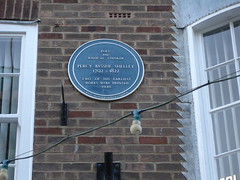
.jpg?width=250)

